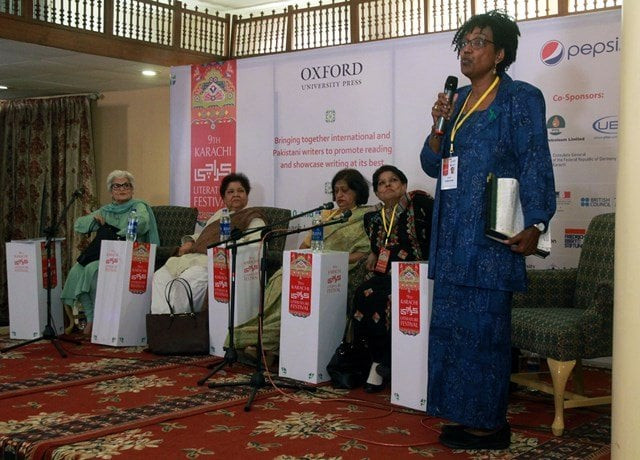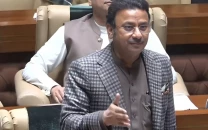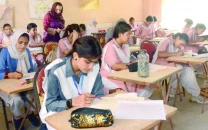From history to her story
Four women discuss the importance of female autobiographies

There is little hand holding if you become a rebel, said Kesho Scott. PHOTO: ATHAR KHAN/EXPRESS
On the second day of the Karachi Literature Festival (KLF) poetesses united for a session on ‘The Power of the Individual Story: Pakistani Women’s Autobiographies’.
Associate Professor of American Studies and Sociology at Grinnell College Kesho Scott began the session by speaking about the history of autobiographies. Women’s autobiographies emerged as a genre in the 1980s, she said, explaining to a pumped up audience that before that autobiographies were a medium of expression for privileged, wealthy and often white males. “[Women] are and always have been the subject of life – we make society,” she said. “I don’t get to leave my woman-ness at home, just like you can’t leave your Pakistani-ness at home,” she told the audience, all of whom hooted and hollered at her words. “Those with the most societal privilege aren’t the only ones who theorise, lead or inspire,” Scott chanted.
Children’s Literature Festival to be held inside Walled City
Poet Kishwar Naheed said through her work, especially her autobiography, she had captured 50 years of women in Pakistan. “Being a woman is tough enough but having problems like poverty added to that is even worse,” said poet Attiya Dawood, who chronicled the injustices she had seen in her work. Adding a lighter note to the session, poet Azra Abbas said she began writing because her daughters told her that instead of telling them stories about her youth, she should write it down. For Scott, her autobiography is a form of telling the truth and a means of leaving a legacy for her children.
“The lessons I learnt didn’t come from books, they came from the stories of women,” she said, underscoring the importance of diversity in literature and being free to tell your own story. “We make a way out of no way,” Scott said, adding that women find a way to do things even when the obstacles seem insurmountable.
Kishwar recalled a moment in time when she doubted herself and began to wonder, ‘if I leave poetry, will I become a good woman’. The answer, in her mind, was a resounding no. When she asked herself whether she would be a better wife if she left her job, the answer was again no. “If I leave everything and just cook all day I will need to be locked up in a mental institution,” she laughed, adding that she decided that regardless of the obstacles, her job was to write.
Dawood recalled a long-ago love affair. “People praised my husband for marrying a woman who had had a love affair. The credit always goes to the man,” she sighed. “Women have the right to love too,” she asserted, adding that the credit for being able to love twice should go to her.
Second WOW Karachi festival to be held on December 2
“I have never wanted people to say I’m ‘good’,” said Azra. “It would infuriate me when people said I’m good,” she said. She said she continued on her path, moving, and sometimes kicking, obstacles out of her way.
Often, when a woman acts the same as a man she is termed ‘rebellious’. This very point was brought up during the session, leading Scott to suggest calling women innovative rather than rebellious.
When speaking about her autobiographies’ reception, Kishwar said Pakistani publishers were initially too scared to publish her book. When an Indian publisher printed my book, people were more curious to know why it had been printed by an Indian than anything else, she said.
She went on to speak about making men allies in the fight for equality. “Women aren’t the only ones who need education. Men in Pakistan need to be emancipated too,” she urged, saying that the women will progress while the men will be left behind if they are not freed from this closed mindset.
Adding to this, she said men in our society often look for sensationalism in women’s writing. “If it isn’t sensational then they say ‘maza nahi aya [it’s not worth it]’,” she lamented. Scott added that conversations need to be had with men, especially those who consider themselves feminists.
Ninth KLF opens its doors to Karachiites
“We can take men along with us but they’re unnecessary,” Azra told a member of the audience who asked how to get men to join the struggle for women’s rights. “Do you need help with the path you are taking? If you do need help then maybe the path isn’t for you,” she advised. Scott, however, disagreed and said it is often more efficient to work alongside men and incorporate duality.
She did however say, “There is little hand holding if you become a rebel.”



















COMMENTS
Comments are moderated and generally will be posted if they are on-topic and not abusive.
For more information, please see our Comments FAQ